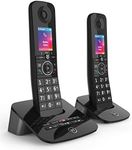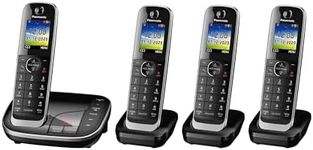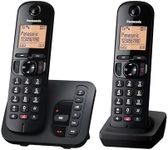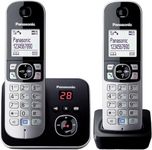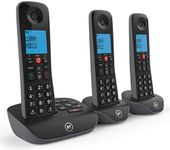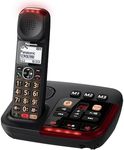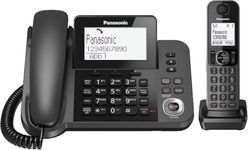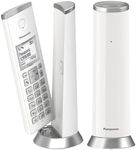Buying Guide for the Best Landline Phones
Choosing the right landline phone involves understanding your specific needs and preferences. Whether you need a phone for home or office use, there are several key specifications to consider. These specs will help you determine the best fit for your requirements, ensuring you get a phone that is reliable, easy to use, and meets your communication needs.Corded vs. CordlessCorded phones are connected directly to the phone line and typically offer more reliable connections and better sound quality. They are ideal for places where the phone will stay in one location, like a home office or kitchen. Cordless phones, on the other hand, offer the convenience of mobility, allowing you to move around while talking. They are great for larger homes or offices where you need to be able to walk and talk. Choose corded if you prioritize reliability and sound quality, and cordless if mobility is more important to you.
RangeThe range of a cordless phone refers to the distance you can be from the base unit while still maintaining a clear connection. This is important if you have a large home or office and need to move around freely. Typical ranges can vary from 100 to 300 meters. If you have a small space, a shorter range will suffice, but for larger areas, look for phones with a longer range to ensure you can stay connected throughout your space.
Battery LifeBattery life is crucial for cordless phones, as it determines how long the phone can be used before needing to be recharged. Longer battery life means less frequent charging and more convenience. Battery life can range from a few hours to several days of standby time. If you use the phone frequently, opt for a model with a longer battery life to avoid interruptions. For occasional use, a shorter battery life may be sufficient.
Sound QualitySound quality is essential for clear communication. Look for phones that offer noise reduction and high-definition audio features. These features help to minimize background noise and enhance voice clarity. If you have hearing difficulties or need to use the phone in a noisy environment, prioritize models with superior sound quality. For general use, standard sound quality may be adequate.
Caller ID and Call WaitingCaller ID allows you to see the name and number of incoming callers, while call waiting lets you know if someone else is trying to reach you while you are on another call. These features are important for managing calls efficiently and avoiding missed calls. If you receive a lot of calls or need to screen calls, these features are very useful. For minimal call management, these features may not be as critical.
Answering MachineAn answering machine records messages from callers when you are unavailable to answer the phone. This is important for ensuring you don't miss important messages. Some phones come with built-in answering machines, while others may require a separate device. If you are often away from the phone or receive important calls, an answering machine is a valuable feature. If you rarely miss calls, you might not need this feature.
Ease of UseEase of use includes features like large buttons, backlit displays, and intuitive menus. These are important for making the phone user-friendly, especially for elderly users or those with visual impairments. If you need a phone that is simple to operate, look for models with these features. For tech-savvy users, more advanced features may be appealing.
Additional FeaturesAdditional features can include things like speakerphone, speed dial, and intercom capabilities. These features can enhance the functionality of the phone and make it more convenient to use. Consider what extra features might be useful for your specific needs. For example, a speakerphone is great for hands-free conversations, while speed dial can save time if you frequently call the same numbers.
